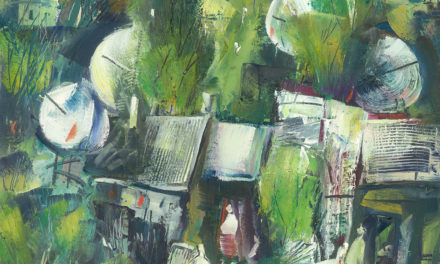Letter from the Editors
by DEVON MONTGOMERY AND MEERA VElu
Issue 4: Faith
Thank you for delving into the fourth issue of Speculative City.
This issue came about uniquely, springing from the theme of knowledge. The works of this issue were originally selected to be features of Issue 3. In assembling that issue, we found two distinct flavors to the theme. Instead of trying to marry the two approaches, we decided to break Issue 3 into two. Faith’s subtle emergence from knowledge ultimately presented an opportunity to the magazine. In 2018, Speculative City’s debut year, we published two issues. This year, we are excited to announce that we will now publish quarterly.
Faith is a curious thing. Like a coin, limited to only two sides, it either bestows confidence or doubt in the heart and mind. In this duality, faith is also rich with nuance and personalizations. Over the course of the works presented here, it is faith that propels each forward.
In “The Anomaly, or the Rise of the World-wheel” by Gunnar De Winter, faith manifests in the main character’s trust in his and his partner’s investigative skills in the face of a world-shattering aberration. Trisha Lowther’s “For a Few Tins of Food” follows a similar approach, but takes it a step further by examining one’s faith to survive in post-apocalyptic conditions. Faith appears as dedication in a story fueled by twists and breakneck action—Carmelo Rafala’s “Children of Itzamná,” the longest piece of this issue. Confidence defines the flavor of faith in these three stories.
In contrast, “Fixed and Gone” by B R Sanders confronts having faith while filled with doubt. In just over 700 words, the short piece tackles the unknowing trust we call faith. Mike Noble’s poem, “Procession of Faith,” similarly explores blind trust—the trust we have in the ubiquity of our technology. Such faith does not always pan out.
Not only does faith connect these works, but a quality reminiscent of pulp fiction enlivens each one. This isn’t to speak on the quality of writing or storytelling making up this issue. Casting aside stigmas and the notions of pulp lacking literary merit, pulp is a vibrant and vital part of speculative fiction history. (Though pulp extends beyond genres.) These stories reflect this colorful part of speculative fiction history by marrying contemporary literature’s attention to language with the boundless, strange, and action-packed worlds of pulp fiction. A luridness peppered through these four stories titillate and revolt as much as they draw you in. Our favorite kind of story!
We have faith you’ll appreciate engaging with these pieces, so without further adieu, enjoy! And don’t stop speculating.
—Devon Montgomery & Meera Velu




